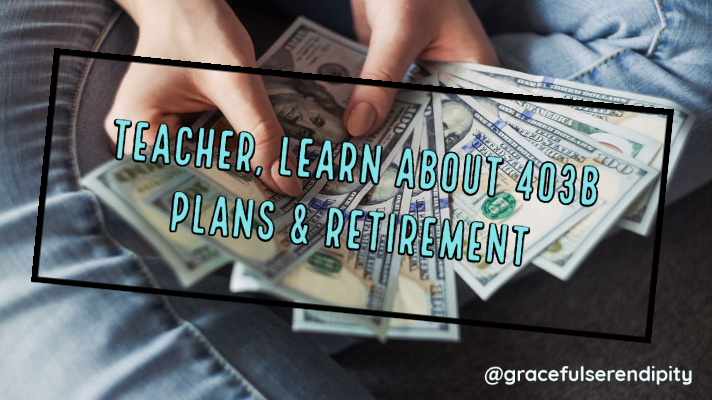Disclosure notice: Please note, I am not a financial advisor and am unable to give financial advice. I am only sharing my experience and what I learned. In addition, this post contains affiliate links, meaning if you click through and open an account, I’ll earn a commission, at no additional cost to you.
Retirement planning? Have you started? Do you know your different investment options? If you asked me a few years ago, I would have told you, “Yes I’m well aware of my options and I have a great 403b plan.”
Oh, if I only understood what an annuity was and why they’re terrible.
Understanding the 403b Plan
When you signed up for a retirement savings plan through your district did you choose the nice person visiting teachers during conferences and after school selling annuities? Or did you relent and offer to listen to an agent after he offered free food during lunch?
That my friend is not the right way to work on your retirement plans. In case you were not familiar, 403b’s are similar to 401k’s but usually done in nonprofit/state governmental agencies. Price matching is usually not a thing and the list of vendors to choose from is often small.
Most school districts offer plenty of annuity options and if you’re lucky one or two mutual funds options.
Still confused? Check out The Balance and Investopedia’s articles about 403bs.
Annuity! But really, annuities!
If you’re school district only offers annuities, then you’re going to have to skip to the next section. If you still need to know why they’re a bad idea, then consider the fact that they have high surrender fees, ridiculous fees, and exorbitant commissions.
In fact, in 2016 a law was passed to protect consumers, because agents usually sold what made them the most money, not what was in the best interest of clients. Personally, I hate to think of all the clients that were preyed upon, including me who fell for these tactics. I got a free dinner at a steak house…probably should have been a sign, but with so many other teachers there and a PowerPoint presentations about guaranteed lifetime income, I felt this made sense! Responsible me would be getting a 403b based on an annuity.
Annuities are terrible ideas and tend to be only recommended for ultra rich people who have nowhere else to put their money for retirement! Teachers, we’re not ultra rich. We’re lucky if we have 200,000 in retirement, let own 20,000.
Still not sold? Thinking, “No Liza, it can’t be that bad.” Annuities are life insurance. You’re betting your retirement on the hope you’ll make it to 80 and enjoy that money. Marc Lichtenfeld who wrote, “You Don’t Have to Drive an Uber in Retirement” basically begs you in this article not to get one.
But, My 403b Is An Annuity! What Do I Do!
Talk to a financial advisor and not the idiot agent who sold you that crappy annuity. The best way to go about this is through a combination of research and seeing which agents your school approves through their 403b approved vendor list.
Some of the research I did involved looking at their websites, Google and Yelp reviews, LinkedIn profiles, and anything that came up with the business their affiliated with and what that company had to offer.
Your best plan is to probably wait out until the surrender fee is over. A qualified financial advisor will warn you about the high surrender fees associated with the product.
My District Only Offers Annuities
Talk to your district officials overseeing benefits at your district to include mutual funds. If your particular union has clout, now might be the time to use them to your advantage.
Before making any rash decisions, talk to a financial advisor. Don’t solely rely on the agent approved through your district. Many financial advisors offer free consultations, so find one that meets your needs and ask them questions. They should be able to answer them, without playing any games.
I Want To Try Investing Myself
Research. Research again. And then research some more.
I ended up using Acorns and Charles Schwab as my platform to invest as I wanted other options outside of the 403b.
ACORNS
Acorns actually became my test account, as I didn’t know what to expect Even when researching on Reddit, I learned that Acorns typically has a lower risk profile, even if you choose high risk as your portfolio. For me, the money in that investment account is a bit of a “emergency savings” account for now. I’m not sure what to do with that money specifically, other than keep investing until I’m satisfied with the amount.
I also opened a traditional IRA account through Acorns called Acorns Later.
Things I like about Acorns is that you can use your spare change when spending to fund your account. As it’s a financial account it’s secure, hence why it’s linked to my checking. There are options to choose small increments to invest in your IRA or investment account, based on your tolerance level. You have the option to transfer money to Acorns daily, weekly, or monthly. For me, after much research I saw that weekly contributions rather than monthly contributions yielded better results for me in a modified version of dollar cost averaging.
It should be noted Acorns does all the thinking for you as it automatically invests your money. For me it was a safe way to start investing as I saw where the money was going, though I couldn’t pick and choose. As a beginner, I appreciated the baby steps approach.
However, what happens if you’re more financially literate?
CHARLES SCHWAB
This company is interesting, because you have one of three options. You can do the investing on your own. Second option is to use one of their financial advisors. Third option is to have a robo advisor, basically an algorithm that automatically makes investments for you based on your needs with 24/7 access to real people, should you need it. I think all of these options are great, by the way.
As I am trying to learn more about the stock market and finances I took the riskiest route by choosing how to invest my money. I’ve bought stocks, only after careful research and have been satisfied with the results. My account is relatively small, so if I make a huge error, the loss will not have a devastating impact on me.
I know that’s not a risk most teachers can tolerate, which is why it would be advisable to connect with one of their financial advisors. However, if you simply want to open say trade a mutual fund or buy a bond, even open a CD, you have all those tools at your disposal.
Best part is their research section. There are so many things you can learn. It may seem overwhelming, but knowing you can look up information on stocks to general financial literacy is a huge bonus to me.
Final Thoughts & Resources
I felt I should have known this information years ago. However, I’m glad I took control of my financial future. I encourage you to check out the links below, my favorite is the Facebook group, and start your own personal journey into financial literacy.
Still want to learn more? Visit these sites:
- A Better Retirement Plan for our Hardworking Teachers
- 403bwise: Facebook Group
- 403bwise: website
- Pros and Cons of 403(b) Plans for Educators and Non-Profit Workers




